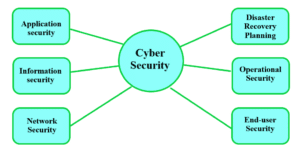Introduction
Cybersecurity has become an essential component of any organization’s operations in the current digital era. The need for qualified cybersecurity professionals is growing due to the rise in cyber threats. This article will walk you through the different career paths, skills
needed, certifications to pursue, and job opportunities in this exciting field if you’re thinking about a career in cybersecurity.
Career Paths in Cybersecurity
Cybersecurity offers a wide range of career paths, each focusing on different aspects of protecting digital information. Some common career paths include:
1. Security Analyst: The task of keeping an eye out for security breaches on an organization’s networks and looking into them when they do occurs falls to security analysts. Additionally, they create security guidelines and protocols to fend off potential dangers.
2. Ethical Hacker: Hackers with an ethical bent, commonly referred to as penetration testers, use their expertise to find security holes in systems. After that, they inform the organisation of these vulnerabilities, assisting them in fortifying their defences.
3. Security Architect: Organisations hire security architects to design and construct secure computer systems. They create security protocols and make sure that all systems used by the company abide by applicable security laws and standards.
4. Incident Responder: When there is a security breach, incident responders are in charge of
handling it. In addition to attempting to stop the breach, they look into what caused it and create a
strategy to stop it from happening again.
Skills Required for a Career in Cybersecurity
To excel in a cybersecurity career, you’ll need a combination of technical skills, soft skills, and industry knowledge. Some key skills include:
1. Technical Skills: It is necessary to be proficient in programming languages like Python, C++, and Java. It’s also essential to understand operating systems, networking protocols, and cybersecurity tools.
2. Analytical Skills: To detect and stop cyber threats, cybersecurity professionals need to be able to analyse complex data and spot patterns.
3. Problem-Solving Skills: Critical thinking and problem-solving skills are essential in cybersecurity because threats can change suddenly.
4. Communication Skills: Strong communication skills are crucial for cybersecurity professionals because they frequently have to explain complex technical information to stakeholders who are not technical.
Certifications in Cybersecurity
Obtaining certifications can improve your chances of landing a job by demonstrating your proficiency in particular cybersecurity domains. Several well-liked cybersecurity certifications consist of:
1. Certified Information Systems Security Professional (CISSP): Employers highly value this certification as it shows expertise in cybersecurity.
2. Certified Ethical Hacker (CEH): Your proficiency in penetration testing and ethical hacking is verified by the CEH certification.
3. CompTIA Security+: For those just getting started, this entry-level certification is a good place to start since it covers fundamental cybersecurity concepts.
Job Opportunities in Cybersecurity
In the upcoming years, there will likely be a significant increase in the need for cybersecurity specialists,
creating a multitude of employment options. Typical job roles include the following:
1. Security Analyst
2. Cybersecurity Consultant
3. Network Security Engineer
4. Chief Information Security Officer (CISO)
Conclusion
A career in cybersecurity offers a rewarding and challenging path for those interested in protecting digital information. By acquiring the necessary skills and certifications, you can take advantage of the numerous job opportunities available in this dynamic field.






